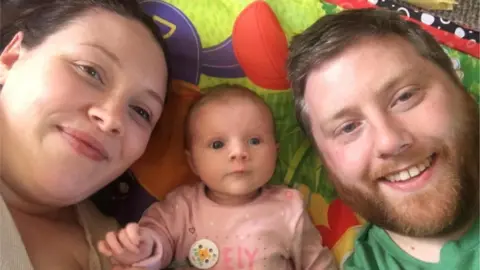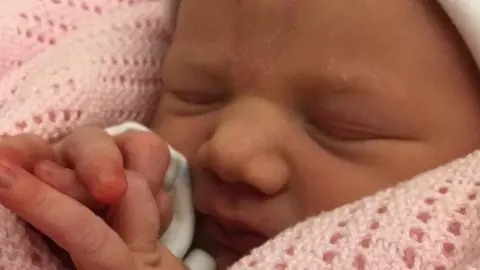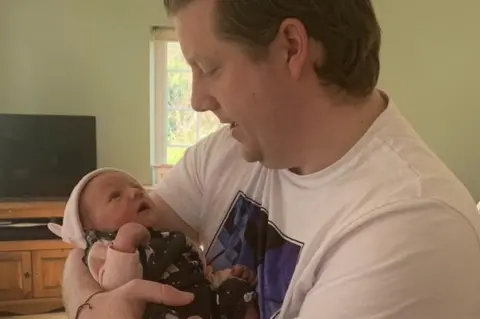Coronavirus: The dads forced to miss out on milestone moments
 Sian Mulholland
Sian MulhollandSince the coronavirus lockdown began, expectant couples have had to deal with strict rules that have significantly affected some of the major milestones to parenthood.
Pregnant women have attended ultrasound scans alone after birth partners were banned from accompanying them to appointments.
The rules were put in place across Northern Ireland to stop the spread of Covid-19.
In the Republic of Ireland, some even missed the birth of their children after a hospital banned partners from entering its maternity unit.
In Northern Ireland, birth partners were not banned from births, but did face restrictions on visiting their pregnant partners and newborn babies in hospital.
From today (Monday 6 July), maternity unit restrictions are being eased in Northern Ireland. But, for many, the lockdown rules have added to the stress and anxiety of pregnancy.
BBC News NI has spoken two couples about their experiences of becoming parents during a pandemic.
'I have felt that I've missed out'
Conor and Sian Mulholland from Bangor, County Down, are expecting their first baby in the middle of August.
Sian is due to give birth in Belfast's Royal Jubilee Maternity Hospital, where she has worked as a midwife for the past three years.
Conor was able to attend their first pregnancy scan at 12 weeks in February, but since the coronavirus lockdown in March, he has not been allowed to attend any further scans or appointments.
"I have felt that I've missed out," he said.
"Particularly because it's our first child. It would be different if it was the second child and it was a case of 'been there, done that'."
But the 33-year-old said the hardest part was not being there to provide emotional support to Sian.
 Birthwise
BirthwiseLike many expectant dads, he has driven his wife to the hospital for each appointment and waited anxiously outside for updates.
"I think it was his way of feeling involved," Sian said.
While the couple understand why the safety measures were put in place, Sian said the experience has been hard on both of them.
She had to attend their 20-week scan alone, which can be daunting as this examination checks for signs of physical abnormalities.
She added that her husband has not been able to ask medics questions about their child's development or hear their baby's heartbeat in months.
Conor said they were both "ecstatic" when it was confirmed last week that restrictions were being eased.
"Sian had her head in the laptop for an hour and a half, waiting on the announcement," he said, while she added that it has relieved some of her anxiety about giving birth.
However, she knows that not everyone has been so fortunate.
"For women who have received bad news during these scans, it must be heartbreaking to go through that alone."
'The most wonderful and difficult days of my life'
In the Republic of Ireland, some hospitals imposed even stricter maternity measures at the beginning of lockdown.
Gloria Shannon and her partner Aidan Cunningham, from Mullingar, County Westmeath, were excitedly awaiting the birth of their first child when Gloria received a message that filled her with "dread".
On the day her baby was due, 27 March, she found out that her local hospital had imposed a visitor ban so stringent even expectant fathers were not allowed to attend the birth of their own children.
The ban had been introduced at the Midlands Regional Hospital the day before, as Ireland's health service prepared for a surge in Covid-19 cases.
"I felt sick. In fact I cried so hard I did get sick. How was I going to do this alone?" Gloria recalled.
 Family photo
Family photoAfter her initial shock, the 28-year-old said she became a woman on a mission - contacting politicians and even starting a petition in a "desperate bid" to get the ban overturned, but nothing worked.
She was almost a week late going into labour on 2 April.
When Aidan drove her to the hospital, all he could do was leave her to the door.
"I wanted to fall to the floor in a pile as I walked towards the maternity unit, watching Aidan walk away," she said.
Although her partner could not be with her, she said she had been reassured he could stay in contact by phone and video call throughout the birth.
But a complication during labour meant Gloria was asked to switch off her phone in case the signal interfered with equipment used to monitor the baby.
"I felt so alone," she said. "I couldn't have his hand to hold and now I couldn't even hear his voice."
Baby Lily Cunningham was delivered safely on 4 April, but she was two days old before she was able to leave hospital and meet her father for the first time.
 Family photo
Family photo"Those two days were the most wonderful and difficult days of my life in equal measure. I felt guilty for enjoying her because he couldn't - not the way I could," Gloria said.
"He wasn't going to be able to hold her, smell her, see how tiny and perfect she was for two days."
Aidan said it was "very emotional" when he finally got to see his first born child in the flesh - baby Lily was handed over to him in a car seat at the doors of the maternity unit on 6 April.
"It's sounds strange but I kind of knew her already because Gloria had been so good at sending me pictures and videos on her phone to make sure I didn't miss out," he said.
 Family photo
Family photoAidan said he's come to terms with missing Lily's birth but is still concerned about the long-term effects on Gloria, who has become "fearful" of giving birth again.
"I felt the actions of the hospital were quite unnecessary," he added, pointing out that other Irish hospitals continued to allow fathers to attend births during lockdown.
At the time, Midlands Regional Hospital apologised "for any distress caused to both parents and birthing partners" but said the ban was necessary to protect patients and staff from Covid-19.
It has since told BBC News NI the restriction was introduced because of "potential patient infection" and "concern that infection of any members of the small staff at Mullingar could have an impact on the service provided to patients".
The ban was lifted on 9 April, five days after Lily's birth.
